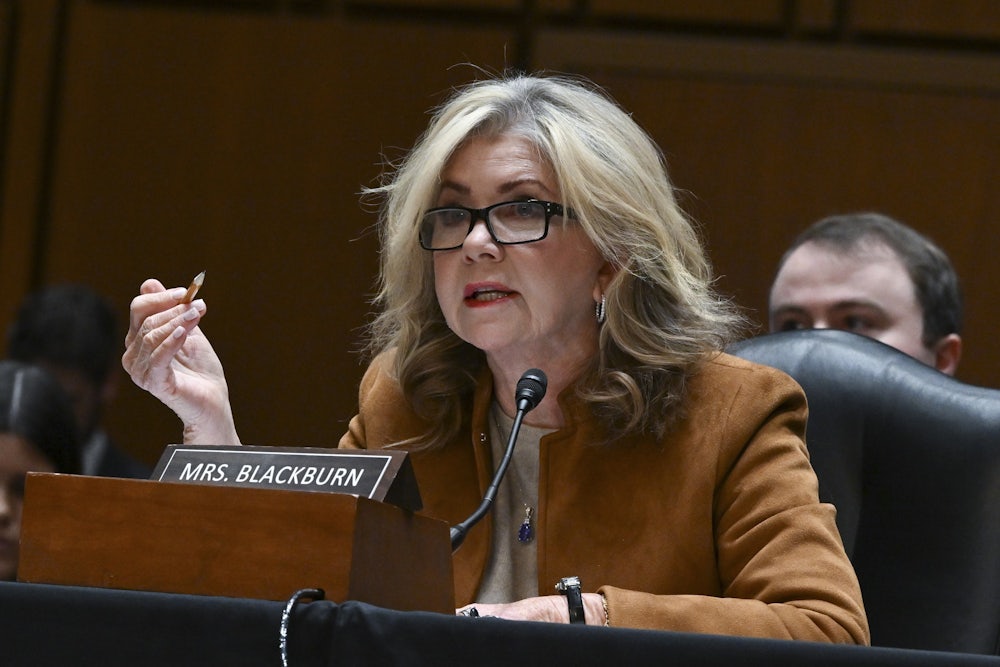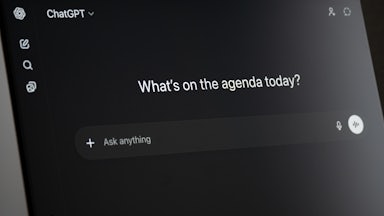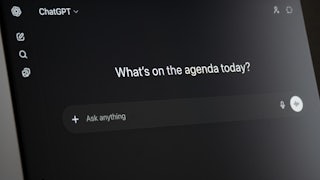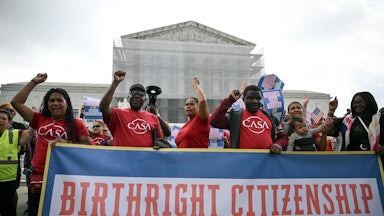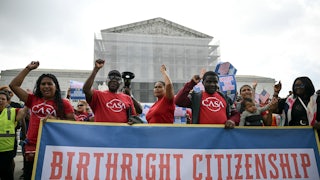The fairly routine ritual interrogation of tech CEOs before a congressional committee hearing took a swerve Wednesday, when X (formerly Twitter) pledged its support for an “online safety” bill that would give Republicans another weapon in their assault on queer and trans people. The Kids Online Safety Act, or KOSA, has been touted as way for tech companies to be held accountable for harm to minors, including from unwanted exposure to content on eating disorders and suicide or from adults’ ability to message minors for the purpose of extracting explicit photos from them. But it has also raised alarms from LGBTQ rights groups and internet policy groups alike, because KOSA could lead to queer and trans content and community spaces being censored and shuttered by platforms, further isolating and possibly endangering LGBTQ youth. In a political moment in which these young people’s ability to be themselves or even read about themselves in school is under threat from Republicans, and when real-life queer and trans community spaces have become targets for violence from the right and far right, how could tech companies that typically pride themselves on LGBTQ+ allyship back such a bill?
Over the months since it was introduced, KOSA has found bipartisan support, with Democrats aligning with Republicans under the banner of promoting “online safety.” This umbrella cause covers what each party tends to define as the big problem with tech companies: KOSA offers an opportunity for Republicans to graft their invented victimhood at the hands of tech platforms—all the tortured claims of their speech being suppressed by Big Tech—onto fears about actual young people being victimized by someone they are communicating with online. Very old tropes about a rich, powerful cabal preying on children in secret have been retooled to turn Big Tech into child predators. The question of the precise truth content of these claims, or whether the problem is solvable by Congress, tends to recede beneath the rhetorical waves: Any opportunity that Senator Lindsey Graham has to accuse Mark Zuckerberg of having “blood on his hands,” as he charged on Wednesday, and as correct as he may be, is one he and his colleagues will seize. The bonus for Republicans who hate Big Tech is that KOSA gives those same companies an excuse to suppress queer and trans content online.
Senator Marsha Blackburn, a KOSA co-sponsor, has been very direct about this. For her, “protecting children” means preventing young people from going online and learning that trans people exist. “Protecting minor children from the transgender [sic] in this culture and that influence,” is one of the most important issues conservatives can take a stand on now, Blackburn said, in an interview with the Family Policy Alliance, a group pushing anti-LGBTQ rights laws. “And I would add to that, watching what’s happening on social media. I’ve got the Kids Online Safety Act.” This bill, she claimed, “would put a duty of care and responsibility on the social media platforms, and this is where children are being indoctrinated.… They’re getting onto YouTube to watch a video, and all of a sudden this comes to them.” (Her legislative director attempted to set the record straight with a post on X that reads: “This is false. These are two separate issues being taken out of context. KOSA will not—nor was it designed to—target or censor any individual or community.”)
For Democratic co-sponsors of the bill, like Senator Richard Blumenthal, these remarks from his colleague make selling KOSA difficult. “I fundamentally emphatically disagree with Sen. Blackburn’s position on the LGBTQ+ community,” he said in September to Slate. That’s nice, but it doesn’t address one of the most dangerous components of KOSA: It puts enforcement power in the hands of state attorneys general, the same law enforcement officials now pursuing teens seeking an abortion or gender-affirming care across state lines, and who ask their parents to report teachers and librarians who make LGBTQ books available to students. Blumenthal himself was a state attorney general, a position from which he launched his offensive on social media, back when MySpace was still popular. “Attorneys general may misuse a bill, but ultimately, they have to face a judge,” Blumenthal responded. “If an attorney general misuses this language, it would be tossed out by a court, and if not by the trial court, then by an appeals court.” For queer and trans people, for people who lost abortion rights, trusting the judiciary to make these calls is unacceptably risky.
Supporters of KOSA are now pivoting to defend against the criticism that they’re isolating LGTBQ kids. The National Center on Sexual Exploitation, or NCOSE, an anti-pornography group formerly known as Morality in Media, has now started to present KOSA and itself as protecting LGBTQ youth. In a briefing the day before the Senate Judiciary hearing, its CEO Dawn Hawkins said that “one of the common comments that we hear as we’re meeting with these tech companies is LGBTQ+ youth need community, they need a place to go to find others who are going through similar life experiences.” The “excuse that community is needed,” as Hawkins put it, one panelist replied, “is a red herring.” Another panelist pushed back on the idea that sexually explicit material—which all of these platforms say they work to block minors from viewing or posting—can be a way for LGBTQ people to “understand their sexuality.” No, he said, “it’s distorted their sexuality.”
If KOSA’s supporters are trying to distance the bill from harm to queer and trans youth, having NCOSE leadership be part of a panel at the Heritage Foundation following Wednesday’s Senate Judiciary hearing was an odd choice. In a way, NCOSE fits right in at Heritage: Its senior legal team is drawn from the ranks of Alliance Defending Freedom veterans, a Christian-right legal organization that often partners with Heritage, such as on Project 2025, its plan to (among other things) roll back LGBTQ rights on day one of a presumed Trump presidency. “Tech companies aren’t just protecting the perpetrators of sexual harm,” Hawkins said on the panel. “They are the perpetrators themselves.” Unsuprisingly, given the venue, when speaking about the specifics of such harm, Hawkins failed to mention harm to LGBTQ teens.
But the real tell was this: These tech platforms, Hawkins said, have “taken our power and our rights away as parents.” Others at the event, like Virginia Attorney General Jason Miyares, spoke of the hearing as an “inflection point,” owing to the “whole parental rights movement.” Repeatedly, speakers emphasized the idea of KOSA and similar legislation as protecting “our children’s innocence.” Those are the watchwords of the Christian right’s investment in legislating the internet: parents’ “rights” and children’s “innocence.”
Republicans have cannily used “online safety” as code for keeping anything vaguely queer away from kids. They’ve got Democrats on board, some eagerly. Twitter/X is now joining Snap and Microsoft in supporting KOSA. That means these platforms are happy to ally with anti-LGBTQ groups now to pass the bill, or at least avoid another troublesome hearing. We already know that X is fine with letting white supremacists on their platform again, readying for a return to Trump, perhaps. Given this, their willingness to ally with the Christian-right establishment on a backdoor censorship bill shouldn’t be such a surprise.
